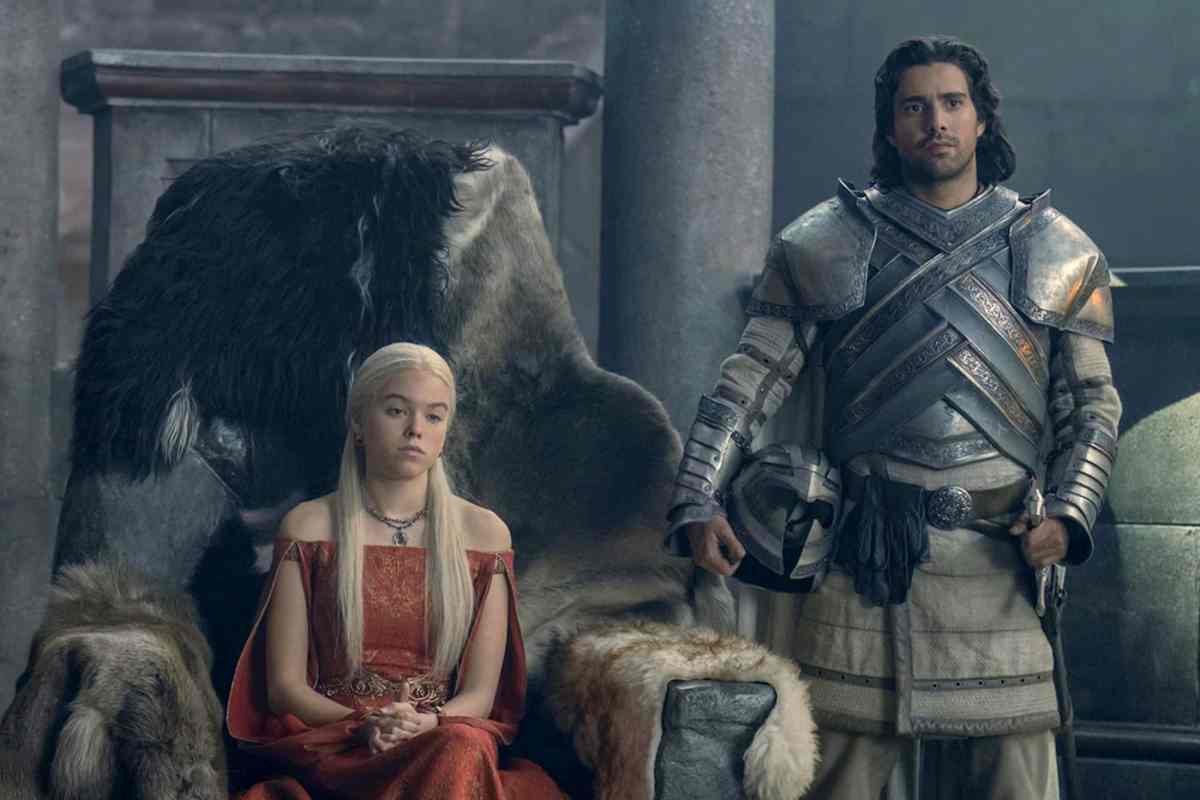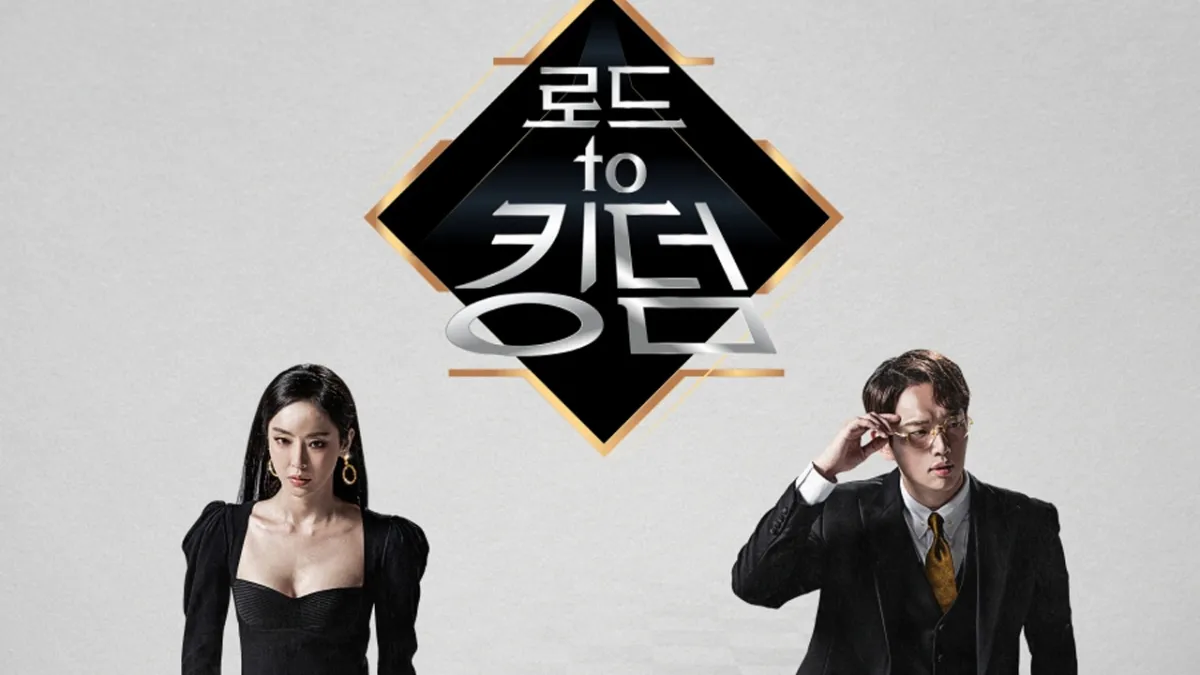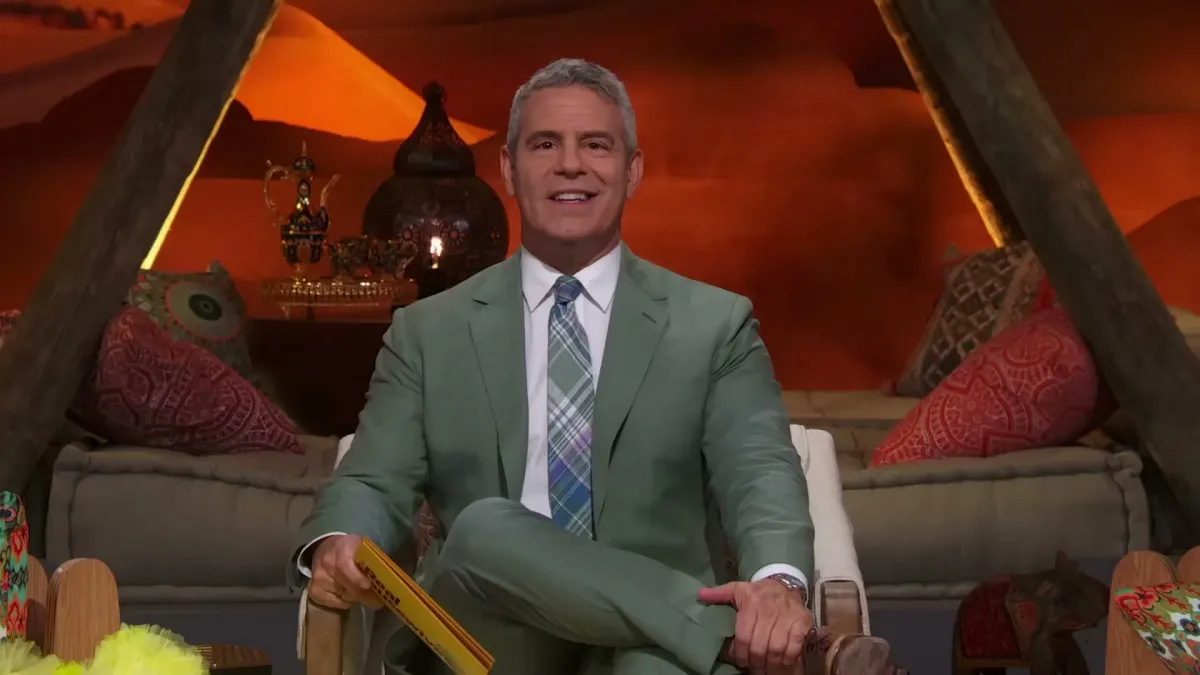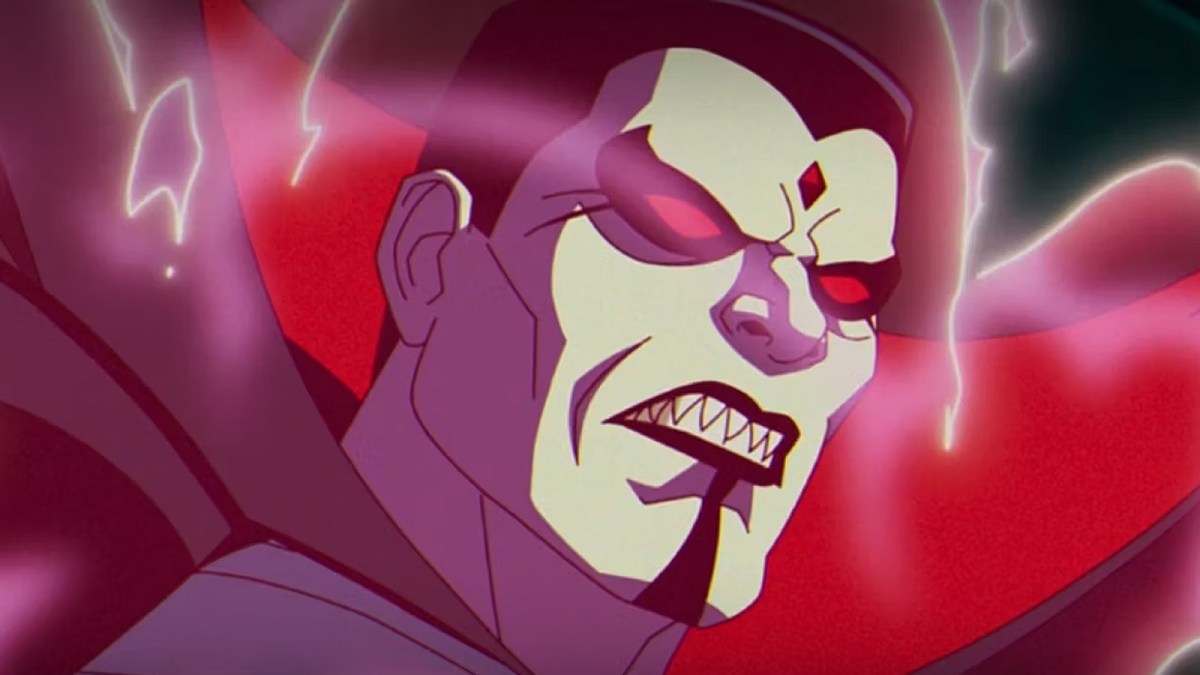This discussion and review contains spoilers for House of the Dragon episode 5, “We Light the Way,” on HBO.
Over the years, people have offered a variety of theories to account for the popularity and success of Game of Thrones. These discussions often tend towards the lurid, centering around the show’s proclivity for sex, violence, and dragons. House of the Dragon has certainly delivered all three by this point in its first season. While those aspects of the show were undoubtedly part of its broad appeal, “We Light the Way” foregrounds another aspect of the franchise’s appeal: the blend of soap and ceremony.
As an outsider, American popular culture’s fascination with and fixation upon royalty is fascinating, particularly given the country’s rather complicated history with the concept. Recent years have seen the American media fixate over the real-life weddings of both Prince William and (then-)Prince Harry. When Harry appeared on The Oprah Winfrey Show with his wife Meghan to dish on tensions within the House of Windsor, it was a genuine cultural event.
American fiction is dominated by royalty, from the “Disney princesses” to the subgenre of royalty-themed Hallmark productions. Even media more explicitly aimed at boys tends to focus on royalty, with the Marvel Cinematic Universe featuring characters like Thor of Asgard (Chris Hemsworth), T’Challa of Wakanda (Chadwick Boseman), and soon Prince Namor of Atlantis (Tenoch Huerta). DC has Princess Diana of the Amazons (Gal Gadot) and King Arthur of Atlantis (Jason Momoa).
There’s a more general Anglophilia within American pop culture, in particular for the import of period shows, dramas with posh actors wearing fine clothes and having arch conversations. The BBC produces adaptations like Pride and Prejudice only for PBS to broadcast them under the brand Masterpiece Theater. Happy Hogan (Jon Favreau) loves Downton Abbey, and he’s not alone. The period soap was arguably more popular in America than Britain.
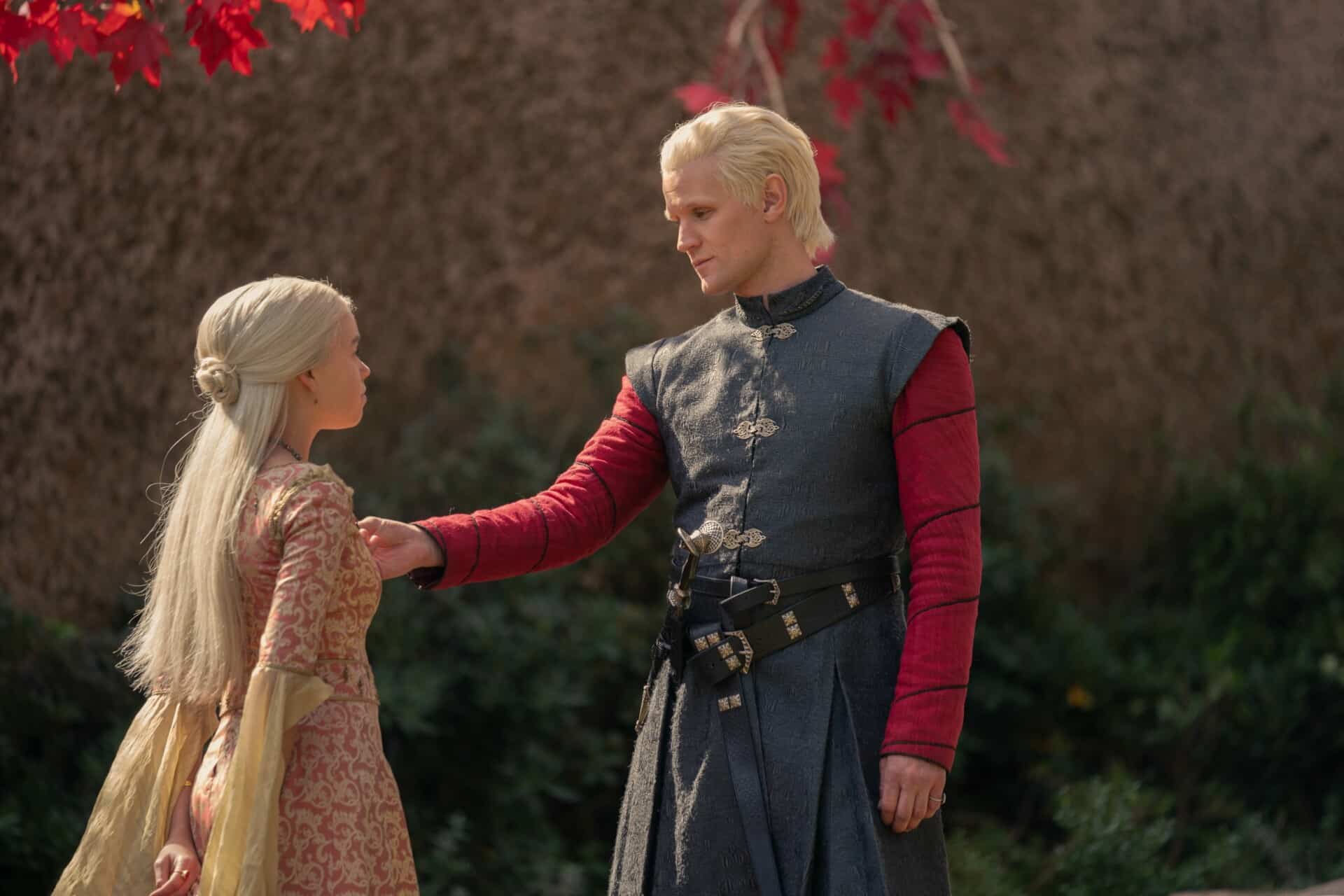
Particularly in its early seasons, Game of Thrones leaned into that. There is perhaps no other explanation for whatever Peter Dinklage was doing with his accent. Certainly, the series is superficially similar to those imported period dramas, as people in nice costumes scheme and plot in a vaguely historical setting. Part of the genius of Game of Thrones as a breakout hit was the way that it blended those lavish trappings with more bombast and brutality.
Much of the first season of House of the Dragon has seen the show grappling with Game of Thrones and defining its relationship to the earlier series. “The Heirs of the Dragon” wrestled with the baggage the show inherited from the popularity of Daenerys Targaryen (Emilia Clarke) and the controversy around her ending. “Second of His Name” even went out of its way to restage a set piece that had to happen offscreen during the first season of Game of Thrones, but was now safely in the budget.
“We Light the Way” brings the show’s soapy and period trappings to the fore, focusing on the wedding of political convenience between Rhaenyra Targaryen (Milly Alcock) and Laenor Velaryon (Theo Nate). It’s the perfect occasion for feasting, dancing, passive-aggression, and aggression-aggression. “We Light the Way” is an episode where so much of the drama is found in characters exchanging charged glances across a crowded room and where a costuming choice is a declaration of social war.
House of the Dragon has been remarkably solid so far, particularly given the weight of expectation pressing down on it. However, “We Light the Way” is the most purely enjoyable that the series has been to this moment in time. Part of this is simply functional; the previous four episodes were largely about mapping the central cast, their relationships to one another, and stakes, and “We Light the Way” serves as dramatic payoff to all that. The players have been introduced; now they can bounce off each other.
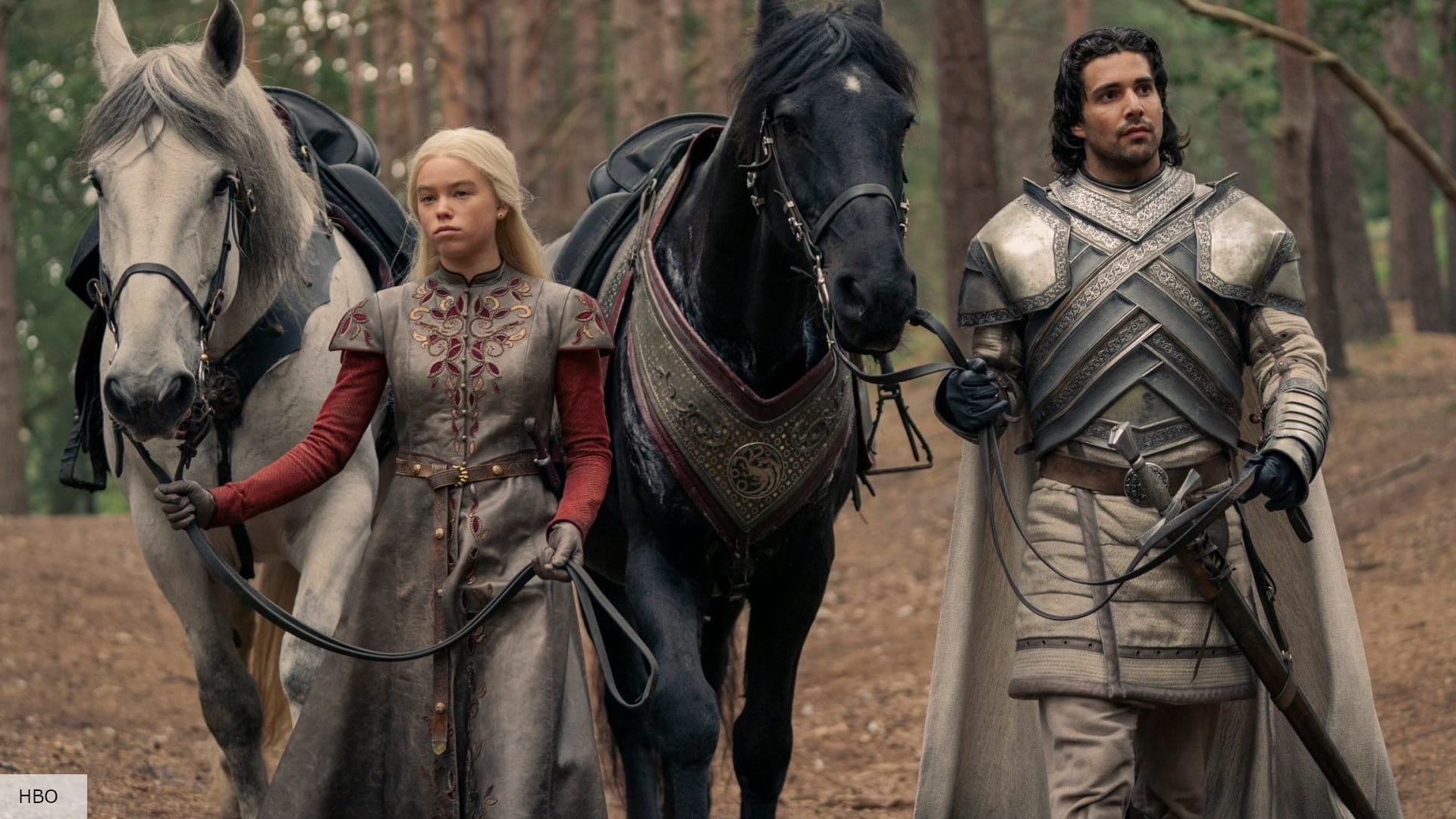
“We Light the Way” plays its tropes remarkably straight. There are a lot of tense exchanges and implied threats. The dining hall is the site of a more veiled sort of warfare. “I was never much of a dancer,” Rhaenyra tells her husband-to-be. “It’s not much different from combat,” he replies. Rhaenyra muses, “We should hope for a different outcome.” The royal hall is a battleground of a different sort, where words and glances are weapons ready to be deployed.
Gerold Royce (Owen Oakeshott) confronts Daemon (Matt Smith) about his involvement in the murder of Daemon’s wife and Gerold’s daughter, Rhea (Rachel Redford). “In the Vale, men are made to answer for their crimes, even Targaryens,” Gerold warns. Of course, the language of court is so formal that Gerold has to formally declare his intention, “I am making an accusation.” Nevertheless, Daemon skillfully outflanks him, calling on the rites of succession to claim the Runestone for himself.
Daemon navigates this battleground with considerably more skill than Ser Criston Cole (Fabien Frankel). Laenor’s lover Ser Joffrey Lonmouth (Solly McLeod) deduces that Cole has been “cuntstruck” by Rhaenyra and teases the knight about their parallel relationships to the marrying couple. Cole lacks the grace to navigate such a conversation. “If you have something to say, Ser Joffrey, speak it,” he presses. Soon, words alone are not enough.
Cole lashes out at Lonmouth, beating his opponent to death in a brutal public spectacle that casts a pall over the event. Then again, this is a common and clever juxtaposition in both Game of Thrones and House of the Dragon, suggesting that (to borrow a quote) social occasions are only warfare concealed. It recalls how “The Heirs of the Dragon” cut between the birthing and the tournament, suggesting a common violence stirring beneath both events.
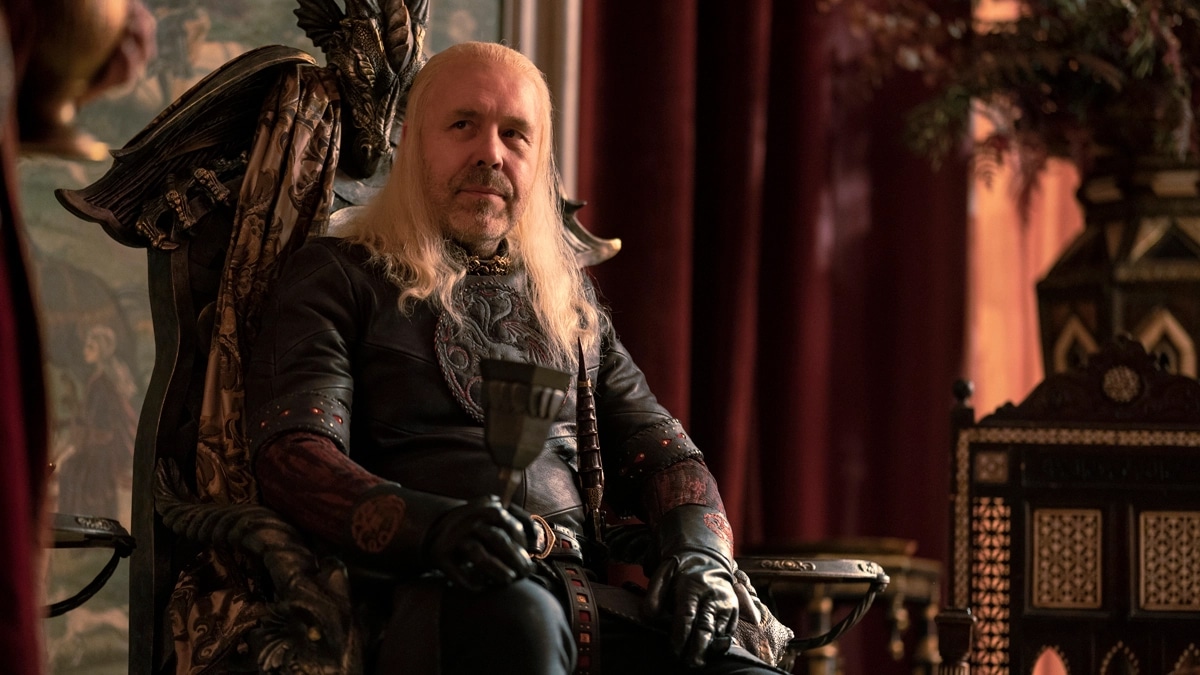
“We Light the Way” feels like something of a mid-season finale. There have been time jumps throughout the season. About three years passed between “The Rogue Prince” and “Second of His Name,” while enough time had passed between “Second of His Name” and “King of the Narrow Sea” that Rhaenyra was only two months away from completing her tour of potential suitors. However, “We Light the Way” plays as the culmination of the show’s opening act, as Milly Alcock and Emily Carey give way to Emma D’Arcy and Olivia Cooke.
This passage of time is interesting. There is something inherently autumnal about House of the Dragon, even outside of the audience’s knowledge that the Targaryen rule of Westeros will end with Robert’s Rebellion. In “King of the Narrow Sea,” dead leaves decorated the floor of the great chamber at the Dragonstone. In “We Light the Way,” they greet Viserys (Paddy Considine) on his visit to Rhaenys (Eve Best) at Hightide. The audience knows that “Winter is coming,” but the fall is already in motion.
This perhaps explains Viserys’ melancholy, as he ruminates on his place in history. “Will I be remembered as a good king, Lyonel?” he asks Lyonel Strong (Gavin Spokes). “I have neither fought nor conquered, nor suffered any great defeat.” Lyonel thoughtfully replies, “Some might call that good fortune.” Viserys accepts the point but presses his argument, “It hardly makes a good song, does it?” House of the Dragon returns to the question of what it means to be a good king.
Viserys is frustrated by his own passivity, the sense that he has done little to alter the flow of history around himself. “You have kept the realm strong,” Lyonel offers by way of reassurance. That is perhaps debatable, given the storm on the horizon, but it is true enough. “Is it not better to live in peace than to have songs sung after you are dead?” Viserys admits, “There is a part of me that wishes I had been tested.” Lyonel cautions him, “Many that are tested only wish to have been spared.”
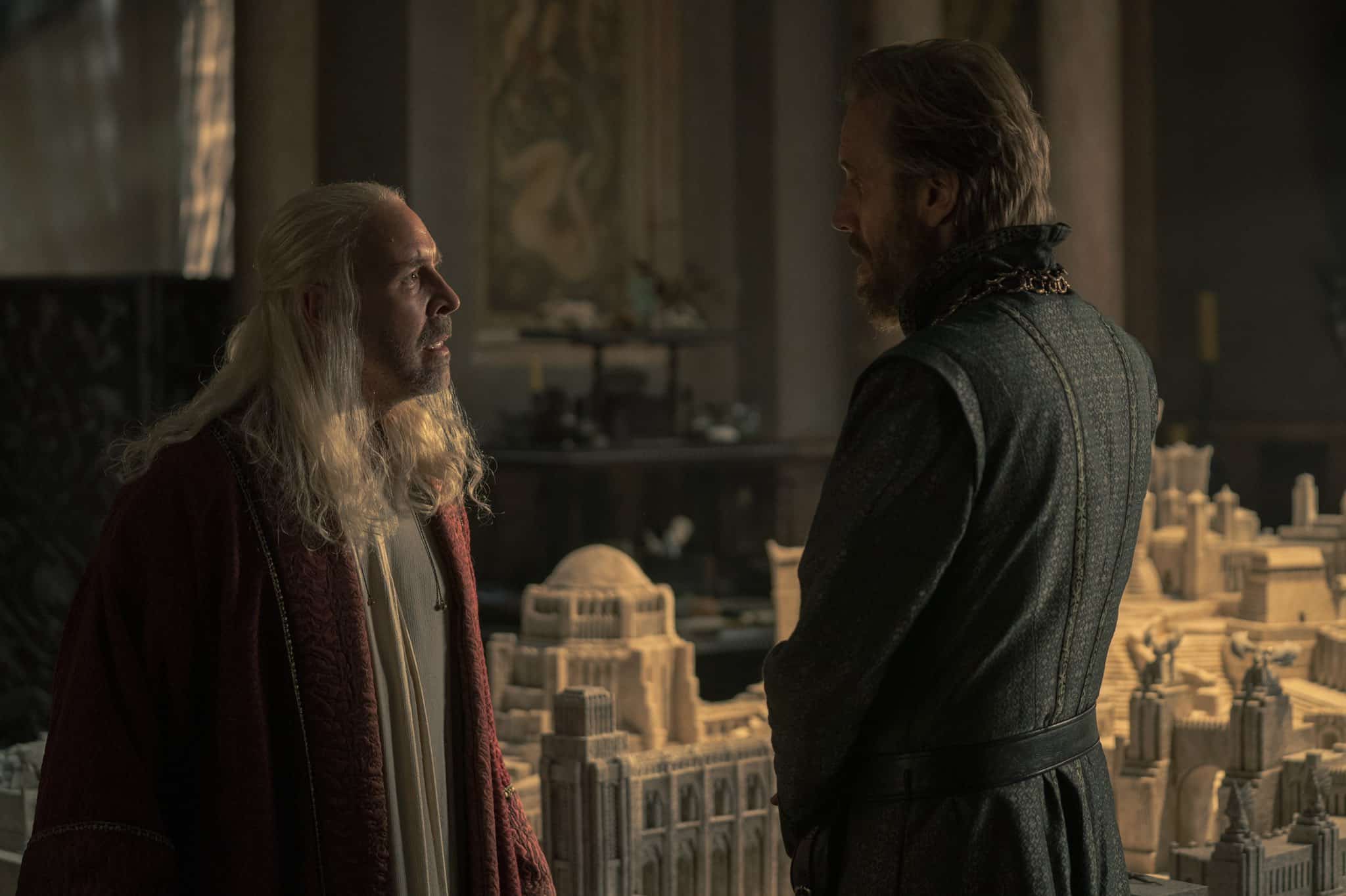
There is something to be said for the way that House of the Dragon uses its time jumps to reinforce the idea that Westeros has been relatively stable during Viserys’ reign. It is hard to figure out exactly how much time has passed, but that is because things have remained surprisingly consistent. There is an irony in all this, in that what has made Viserys a reasonably competent monarch makes him a particularly uninteresting historical figure. He is a caretaker, not a game-changer.
There is a sense in which House of the Dragon is not as cynical as Game of Thrones was, particularly when it comes to the question of the eponymous game. Game of Thrones was built on the paradox that many of the people who sought power like Daenerys Targaryen or Stannis Baratheon (Stephen Dillane) were too monstrous to use it wisely, while those who stumbled into power accidentally like Robb Stark (Richard Madden) or Jon Snow (Kit Harington) were too clumsy to use it well.
Daenerys was doomed at the end of the first season. Jorah Mormont (Iain Glen) urges her to flee to Asshai or to sell her dragon eggs and live in peace for the rest of her days in the Free Cities. With her abusive brother (Harry Lloyd) and husband (Jason Momoa) dead, Daenerys could have been truly free of everything. She could have become an explorer, like Arya Stark (Maisie Williams) does at the end of the show. Instead, Daenerys committed to the game and all that it entailed.
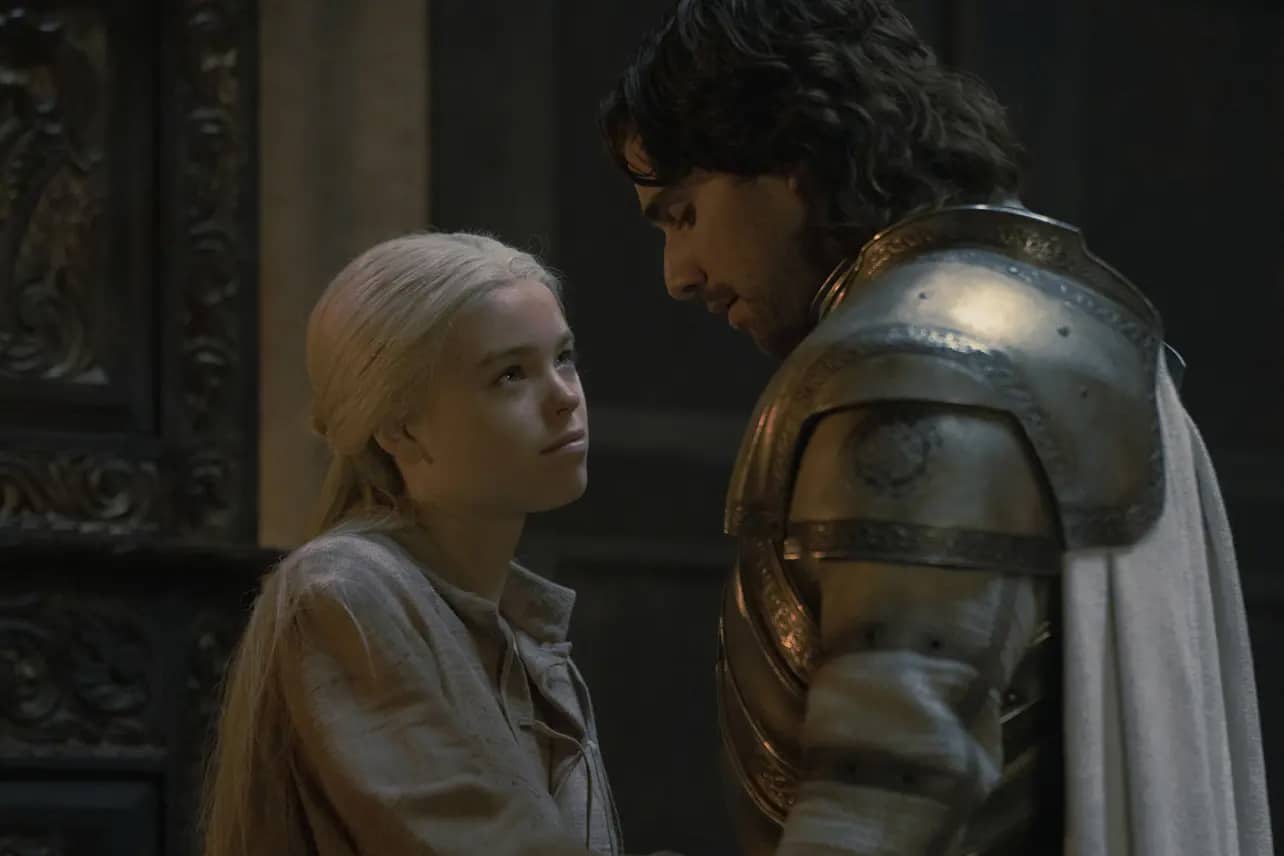
“We Light the Way” contains a similar moment of commitment from Rhaenerys. Like Daenerys, she is approached by a disgraced knight who is obsessed with her. “I am asking you to come with me, away from all of this: from the burdens and the indignities of your inheritance,” Cole begs. “Let us leave it all behind and see the world — together. We will be nameless and free. Free to go where we like, free to love as we like.” It’s very similar to Jorah’s appeal to Daenerys, right down to fleeing to the east.
Rhaenerys rejects Cole’s proposal. “I am the crown, Ser Cristin,” she states. “Or I will be. I may chafe at my duties, but do you think I would choose infamy in exchange for a bushel of oranges or a ship to Asshai?” She continues, “The Iron Throne looms larger than me, larger than anything in my family.” Mormont was a complicated figure in Game of Thrones, especially given his creepy fixation on Daenerys, but he was ultimately loyal. “We Light the Way” suggests that Cole is much less reliable.
Ironically for a show that seems unlikely to visit Winterfell, House of the Dragon draws much starker boundaries around and between its characters, more firmly delineating its heroes and villains. The result of all of this is that House of the Dragon seems appreciably less ambivalent about Rhaenerys’ claim on the Iron Throne than Game of Thrones did about Daenerys. Still, House of the Dragon certainly knows how to throw a royal wedding.

